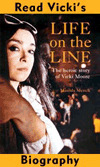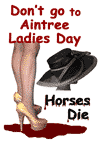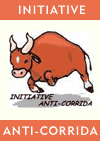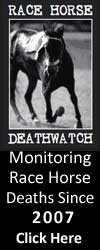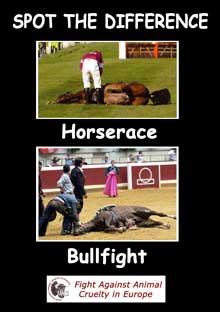HORSE RACING
Horse Racing has been called “The Sport of Kings”...
... it could equally be called “The Sport of Kings of Cruelty”
Cruelty is defined as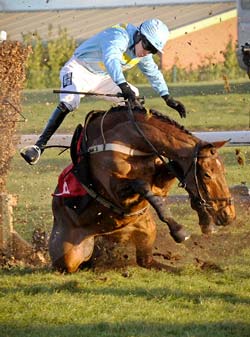
Indifference to suffering or pain, or behaviour that causes pain or suffering
to a person or animal.
Horse racing would seem to fit the bill
Horse racing is considered good fun, where the horses have wonderful lives and the only losses are monetary ones. Sadly this is far from the reality.
Hidden Facts
In the UK around 400 horses are killed in the racing industry annually
Because the intention is not to kill the horses and the deaths are merely a ‘side effect’ of racing, the industry seems to considers them as acceptable 'collateral damage'.
How can so many deaths be considered acceptable?
As a ‘side effect' of bullfighting about 200 horses die every year in the bullrings of Spain, this would cause horror in the minds of most people and yet we choose to ignore the death of over 400 racehorses in our own country.
If only a fraction of that number of jockeys were killed as a result of racing, all race meetings would be stopped immediately.
The Hidden Truth
If you watch horse racing on television the cameras quickly turn away when a horse falls, in case our sensibilities are offended. You don't usually get to see the screen that is erected to hide the bitter truth of the death of a horse.
The general public naively believe that all injured horses are cared for. When horses are injured some are killed because they are not capable of living a reasonable life, but many are killed because their racing life is over and they have no further value. It is better business to collect the insurance. Horse racing is a business and horses are the collateral.
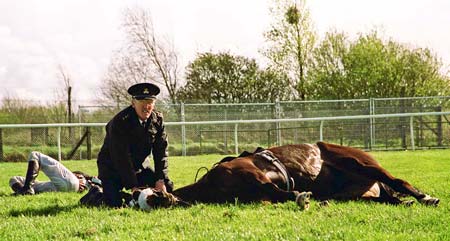 |
| Another Horse Dies at Aintree |
If the owners and trainers were motivated by feelings of humanity instead of profit their horses wouldn't go near a racetrack. It would be asking the impossible for that to happen, but it just seems so very hypocritical when they say that the most important thing is that their horses come back safe and sound.
If only people would think about the consequences for the horses and the cruelty involved, perhaps they would think twice before betting on horse racing. We should think very seriously before we help to pass a death sentence on these horses for our gain.
Most people regard horse racing as a harmless sport in which the animals are willing participants who thoroughly enjoy themselves.
The truth is that, behind the scenes, lays a story of immense suffering.
Sad Facts
Approximately 18,000 foals are born into the closely-related British and Irish racing industries each year. Yet only around 40% go on to become racers. Those horses that do not make the grade may be slaughtered for meat or repeatedly change hands in a downward spiral of neglect. Many are exported alive to the slaughterhouses of Europe.
The survivors are denied their freedom and pushed to their limits to serve the financial interests of trainers, owners and bookies. Because they are bred for speed not strength, many sustain limb and other injuries and are shot.
It is also common for horses to develop serious racing-related illnesses such as bleeding lungs and gastric ulcers. Whilst performing, they are whipped in an attempt to spur them on, which is painful and makes them fearful and distracted. In general, the more a horse is whipped, the less likely they are to win the race.
Investigations have revealed other horrors behind the scenes. The top breeding stallions are over-worked and kept isolated for years from other horses. Breeding females are subjected to an endless cycle of pregnancy that often involves the use of drugs and other artificial interventions.
Changes to Whipping Rules
In The Grand National 2011 there was the spectacle of the winner Bellabriggs in such a state of exhaustion that he nearly collapsed and needed to have water thrown over him and to be given oxygen. Jason Maguire, his jockey, received a five-day ban for excessive use of the whip.
27th September 2011: The following public outcry prompted the British Horse racing Authority (BHA) to bring in new rules on the whipping of horses, in an attempt to make horse racing appear more acceptable.
The new rules were as follows: Offending jockeys would be banned for whipping a horse more than 6 or 7 times, according to the race, and would have their winning money stopped. If they offended more than 3 times they would risk a revue of their licence.
Professor Tim Morris of the BHA said that to ban whipping outright would be to give in to the animal rights groups. He said that the whipping doesn’t hurt. Why then is the BHA bringing in the new rules on whipping?
Perhaps if it doesn’t hurt, an extra penalty could be applied to a guilty jockeys that they receive as many whip strokes as they have dealt to the horse.
November 2011: Because of complaints by penalized jockeys, the BHA started backtracking on the rules and penalties for excessive whipping. We await furthering watering down of the rules and penalties.
In February 2012 the expected changes to the whipping rules took place. The race stewards now have to use their “discretion” in judging if jockeys have whipped excessively and the jockeys will have their suspensions diluted.
Arguments for Horse racing given by the Racing Fraternity
Statement:
The horses love it. The proof is that they carry on running and jumping when their rider is unseated.
Answer:
Horses are herd and prey animals who instinctively run as they feel safer in the herd. When there are runoffs they go around the fences and gradually stop. It is very rare for a horse to jump a fence to get out of a field in which it is grazed and this is with fences a lot lower than the ‘National’ fences. Also they are brain washed in training into running and jumping.
Statement:
If there was no racing there would be no racehorses.
Answer:
This is an argument that is used every time animal abuse is involved. The breeders of bulls for bullfighting say this. Do we believe them?
Fewer horses would be bred, but fewer horses would have to die.
Statement:
The horses have a wonderful life.
Answer:
This in itself is debatable (see Sad Facts). Unfortunately this ‘good life’ stops when the horses don’t pay their way, then the hell for them begins.
Conclusions
It is sad that horses have to die in our pursuit of pleasure, we should have reached the point where betting on a race where horses are very likely to die is unacceptable. There is only one solution for stopping the cruelty of and that is to end national hunt racing. I’m sure it would not be the end of the world
People outside of the UK cannot believe that this is going on in this country.
Bullfighting and Horse Racing
It has been stated a number of times that horse racing is the UK’s bullfighting.
It is possible to draw an analogy between the two.
Although the death of a horse is not the intention in both bullfighting and horseracing it is an inevitable outcome for some horses.
In bullfighting, in Spain, 200 horses die annually.
In horseracing, in the UK, the figure is 400!
What Every Horse Lover Could Do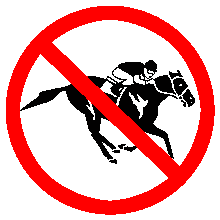
Stop supporting the racing industry by betting on or going to race meetings, especially the likes of Cheltenham and The Grand National.
Talk to your friends and family about the truth behind horse racing.
Please spread the word


